
A Production Production©1998–2025 Dustin Putman

|

 |


2013 was an exciting year for movies. Sequels were plentiful (e.g., " Despicable Me 2," " The Smurfs 2," " Insidious: Chapter 2," " Grown Ups 2," " Red 2," " Hatchet III," " Fast & Furious 6") and so were comic book-adapted superhero continuations (e.g., " Thor: The Dark World," " Kick-Ass 2," " Iron Man 3"), but remakes were noticeably on the decline (" Evil Dead" and " Carrie" were the highest-profile).  Summer tentpoles were underwhelming overall (in terms of solid writing, razzle-dazzle and genuine thrills, my favorite was J.J. Abrams' " Star Trek Into Darkness"), but in between and bookending those big-budget fireworks were a number of outstanding smaller, character-oriented releases and a welcome surge in imagination and auteur passion (see my best list and honorable mentions below). In terms of numbers and stats, of the approximately 160 films I officially reviewed in 2013, this was the best year since at least 2002. The number of truly great movies I saw (those rating three and a half and four stars) numbered 18, while those that were terrible (rating one and below) were on a sharp decline with only 10 (vs. 12 In 2012 and a full 20 in 2011). Per usual, the vast majority fell somewhere in between, but there was nonetheless an electricity in the cinematic air this year, a hopeful feeling that filmmakers were ready to take chances and studios were willing to, for the most part, listen.
In keeping with tradition, the below end-of-year content includes a list of all the performances that in some way touched me throughout this twelve-month calendar year, my picks for the most overrated and underrated titles, and finally my bottom 10 and top 10 lists (complete with customary dishonorable and honorable mentions). New to my annual essay is a fresh section where 10 great movie moments are highlighted. If 2013 is any indication of the turning tides of the motion picture business, of the willingness to break free from copycats and convention and explore originality for a change, then there is quite a bit to look forward to in 2014. 
(my pick for the absolute best is indicated in red)
Best Actor
Best Actress
Best Supporting Actor
Best Supporting Actress

"Lee Daniels' The Butler," directed by Lee Daniels, is an egregiously melodramatic embellishment of a true story that deserved a more honest treatment. The film no doubt means well—its decades-spanning look at the Civil Rights Movement practically screams at the viewer, "This is good for you!"—but the picture is curiously undignified in the often cheap liberties it takes. Based on the article, "A Butler Well Served by This Election," by Wil Haygood, the film proposes to tell the tale of Eugene Allen, a noble black man who served as a White House butler—and later head maître 'd—over a staggering eight Presidential administrations. For reasons that have everything to do with manipulating an audience, screenwriter Danny Strong has done a distinct disservice to Allen by renaming him Cecil Gaines and more or less fictionalizing his past, his family, and most of his experiences. Sure, when making a biopic it is expected that a detail here and there might be changed for dramatic purposes, but what Strong and Daniels have done goes beyond that, sending out the message that Allen's actual life was not interesting or worthy enough to be depicted on the big screen. The clichés come fast and furious in "Lee Daniels' The Butler," as numerous as the amount of times the viewer is reminded this is Serious Oscar Fare™. In rewriting the history of a man who lived to triumphantly see a person of color become the elected Head of State, authenticity is traded for prefabricated dramatic posturing and surface-level emotions. The film is so busy trying to make a big impact that it only succeeds when the rare cast member (i.e., Forest Whitaker as Cecil and Oprah Winfrey as wife Gloria) transcends the calculated restraints placed upon them. Oh, sure, the picture is valiant in its journey through semi-recent American history, but just because a motion picture is sympathetic to a cause doesn't necessarily make it worthwhile—not when there are far better films out there about the same subject matter. If Eugene Allen was still alive, would he be able to recognize himself amidst all the artifice?
Overrated Runners-Up: Ain't Them Bodies Saints; All Is Lost; Captain Phillips; Fast & Furious 6; Rush; This Is the End; The World's End

"The Counselor," directed by Ridley Scott, was an understandably difficult motion picture to market for 20th Century Fox, its sordid, intricately snarled premise not quite simple enough to boil down into a 30-second television ad or even a two-and-a-half-minute theatrical trailer. Opinions were widely varied, with some outrageously brandishing it as one of the worst movies ever made and others, like myself, seeing it for the misunderstood near-masterpiece and future classic it is destined to become in due time. The screenwriting debut of celebrated author Cormac McCarthy, "The Counselor" is a bold, scrupulously devised, rivetingly unpredictable thriller as savagely gripping as an operatic Shakespearean tragedy and as hair-raising as a particularly effective horror picture. Wrapping his audience around the neck like a razor wire tightening upon their carotid artery, Scott takes command of every one of cinematographer Dariusz Wolski's lush, intimate, subjectively loaded shots, while Cameron Diaz is utterly voracious, stealing the show as the confident, controlling, enigmatic Malkina. Diaz was born to play this complex, unsettling character, the machinations of her mind and body so commanding and her dark character so compelling that it's nearly impossible to see anyone else when she's in front of the camera. The further removed one becomes from having watched "The Counselor," the more admirably adventurous and thought-provoking its ferocious pleasures appear.
Underrated Runners-Up: Dark Skies; Disconnect; I Give It a Year; The Incredible Burt Wonderstone; Oblivion; Paradise; Trance

(In alphabetical order; please note that this section may contain mild plot-centric spoilers)
In Jonathan Levine's long-delayed "All the Boys Love Mandy Lane," a montage using Juliette Commagere's wistful cover of America's "Sister Golden Hair" as Mandy (Amber Heard) and her friends take a road trip to their fateful weekend destination proves how powerful the mixture of music, image and editing can be on film when a true artist is at the reins.
Rosalyn's (Jennifer Lawrence) sing-along to Wings' "Live and Let Die," in David O. Russell's "American Hustle," is rapturously entertaining beyond words. She might be bubble-headed when it comes to working the microwave, but she's cleverer where it counts than anyone could have expected.
Carolyn Perron (Lili Taylor) picks the wrong haunted farmhouse to play "Hide and Clap" with her children, in James Wan's "The Conjuring."
The morally corrupt Malkina's (Cameron Diaz) deliciously random, mysteriously motivated stop at a confessional in Ridley Scott's "The Counselor." Does she genuinely want to repent for her sins, or is this just another malevolent game in her arsenal as she challenges the priest on every detail of the church's belief system? Either way, the scene's outcome stings like a swarm of yellow jackets.
Accosted by debris from a Russian satellite, NASA medical engineer Ryan Stone (Sandra Bullock) separates from her cargo bay arm and finds herself terrifyingly thrust into the limitless expanses of space, in Alfonso Cuarón's "Gravity."
The severe, platinum-blonde Crystal (Kristin Scott Thomas), full of acidic force and salty vigor, sweeps onto the scene in Nicolas Winding Refn's "Only God Forgives" with an unforgettable, sinfully funny scene in which she takes none too kindly to being informed by a hotel clerk that her room isn't quite ready.
As Denis Villeneuve's "Prisoners" draws to a close, bereaved father Keller Dover (Hugh Jackman) is still missing. Detective Loki (Jake Gyllenhaal) stays behind for a few moments when the rest of his police crew digging on the property of a crime scene leave for the night. Faintly, through the bitterly cold night air, he thinks he hears something, possibly a whistle. As he starts to walk away, he hears it again—or does he?
When Alien (James Franco) takes to the piano in Harmony Korine's "Spring Breakers," breaking out into the Britney Spears ballad, "Everytime," as the gals dance flirtatiously around him, it is a sequence of startling power, humor turning to poignancy and poignancy turning to imminent menace in veritable flashes—not because of Alien, per se, but from the troublesome possibilities of all their fates.
Via a prerecorded iPad video, hypnotherapist Elizabeth (Rosario Dawson) gives Franck (Vincent Cassel) the option of forgetting the ordeal they have just faced by pressing a special icon on the screen, in Danny Boyle's "Trance." Debating whether he wants to lose the memory of a woman he has very possibly fallen in love with, he cannot help but let out a chuckle as Emeli Sandé's and Rick Smith's transcendent song, "Here It Comes," rises on the soundtrack.
In a desperate bid to escape a home invasion in Adam Wingard's "You're Next," Kelly (Sarah Myers) flees through the forest to the closest neighbor's house. What she doesn't realize is that both of the occupants are already dead. As she becomes next on the masked killers' hit list, a compact disc of the haunting, echoey 1977 pop-rock ditty from Dwight Twilley Band, "Looking for the Magic," chillingly continues on repeat.

 | Runner Runner
If "Runner Runner" demonstrated anything, it is that Justin Timberlake is better onscreen in supporting roles (see the Coen Bros.' "Inside Llewyn Davis"), and Ben Affleck, despite having something of a career renaissance with acclaimed directorial efforts such as 2010's "The Town" and 2012's Oscar-winning "Argo," is still capable of falling into woebegone studio efforts. To be fair, neither of these performers are at total fault here. Directed by Brad Furman, "Runner Runner" is a luster-free star vehicle that fails at intrigue and depth. Delivering absolutely zero insight into the world of online gambling, the film doesn't concern itself with teaching the rules of poker, blackjack and Texas Hold 'Em, nor depicting the process of playing such games. 2008's cool, chic, informative card-counting drama, "21," this is not, and the further "Runner Runner" bumbles along, the more synthetic it appears. |
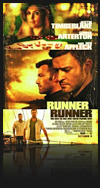 |
 | The Big Wedding
The only reasonable explanation for why such a terrific ensemble cast (including Robert De Niro, Diane Keaton, Susan Sarandon, Amanda Seyfried, Robin Williams and Katherine Heigl) would agree to participate in embarrassing romantic comedy "The Big Wedding" is that they had a desire to work with each other while making a little pocket money in the process. They certainly couldn't have signed on based upon the cringe-worthy screenplay from writer-director Justin Zackham, which tops itself every other minute with the sort of odious would-be humor and off-putting behavior to make a person not be able to stand any of the characters in view. Lines such as, "Who do you have to lynch for a Cosmo around here?" pass for a version of humor that only a Mississippi slave owner in 1858 would likely find funny. |
 |
 | The Wolverine
2009's "X-Men Origins: Wolverine" was a pedestrian attempt to spin off Hugh Jackman's clawed mutant James Logan into his own series, but follow-up "The Wolverine" is even worse, a joyless affair that nearly loses sight of the title character to focus on a Japanese family embroiled in their very own version of "Dynasty." It's exceedingly dull and shockingly limited in scale for a big-budget, summer-released Marvel comic book adaptation, the sort of film a person sits and watches while wondering all along why anything on the screen is worth caring about. Director James Mangold has not succeeded at building upon Logan's character and past; if anything, he is even more of an antisocial grouch than usual. It is few and very far between that "The Wolverine" exhibits an ounce of the thrilling sensation one expects from this kind of movie. The soapy dramatics of a feuding two-dimensional family Logan is pulled in the middle of doesn't cut it. |
 |
 | Movie 43
The only thing worse than a comedy missing a punchline is a comedy of shorts missing eleven separate punchlines. Directed by a cavalcade of filmmaker who should have known better (Steven Brill, Peter Farrelly, Steve Carr, Griffin Dunne, James Duffy, Jonathan van Tulleken, Elizabeth Banks, Patrik Forsberg, Brett Ratner, Rusty Cundieff and James Gunn), "Movie 43" is an asinine, amateurish concoction of stank that would never have made it into theaters were it not for a cast of virtual hundreds, wishing now (and probably even when they shot it) that they had never gotten involved. Years from now, it may be viewed as a curiosity piece—how else to describe a film in which Hugh Jackman has a scrotum hanging from his neck and Anna Faris delights in a scat fetish?—as well as a barren and empty cry for help from stars who should have known better. Nevertheless, in close to every way that it could go wrong, it does, and that's got to be worth a dubious footnote if nothing else. |
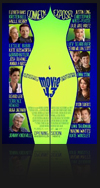 |
 | The Mortal Instruments: City of Bones
Demons, angels, werewolves, oh my! Playing much like bad fan fiction from an immature, lovelorn teenage girl who's seen "Twilight," "Beastly," "Star Wars" and "Buffy the Vampire Slayer" too many times, "The Mortal Instrument: City of Bones" is interminable gobbledygook. Yet another failed adaptation from a young-adult fantasy novel (this one by Cassandra Clare) trying to piggyback on past, better successes like "The Hunger Games," the film spends the bulk of its unruly 130-minute running time buried in convoluted exposition, yet is destined to still alienate anyone who hasn't read the book. Murky motives blur with uninspired CGI overload, an undernourished ensemble too big for its britches, and a romance that turns from emotionally arctic to skin-crawling with a single revelatory plot point. This one is a really tough sit. |
 |
 | Scary Movie 5
You know what's a surefire sign that the comedy spoof subgenre has fallen on hard times? When there were two other such films released in 2013 even more horrifically bad than "Scary Movie 5." With franchise mainstays Anna Faris and Regina Hall wisely sitting this one out, it barely warrants being called a part of the series at all. Save for Molly Shannon's consistently amusing (if thankless) turn parodying Winona Ryder's role from "Black Swan," the picture carries a hit-to-miss laugh ratio of about 1-to-50, the lame jokes and vaguest of lucid narratives crashing to the floor like thrown china. The bombardment of manic onscreen action quickly becomes just plain annoying, while director Malcolm D. Lee even squanders the sight of Charlie Sheen and Lindsay Lohan having sex to the "Benny Hill" theme. "Scary Movie 4" was pretty sorry, but the inexcusably desperate "Scary Movie 5" is this once-prosperous series' death rattle. |
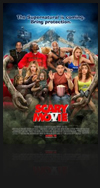 |
 | This Is the End
There are about ten minutes of workable, worthwhile material in "This Is the End," and it comes right at the beginning as the viewer is introduced to an entire ensemble of mostly A-list comic talent (e.g., Seth Rogen, James Franco, Jay Baruchel, Jonah Hill and Michael Cera) starring as exaggerated caricatures of themselves. This is initially amusing as an obviously fictional but intermittently candid insider's look at Hollywood celebrity, but from the moment things take a turn for the apocalyptic all the way through the irritatingly self-congratulatory ending an hour and a half later, "This Is the End" dies a slow, wheezing, woefully unfunny death. There will be audience members who buy into its brand of everything-but-the-kitchen-sink battering, but it will be out of pure submission. For the rest, this IQ-meltingly terrible excuse for a comedy, written and directed by Evan Goldberg and Seth Rogen, is amateurish, pompous, monotonously overbearing, frequently incoherent, and about as vacant and listless as a patient shot up with anesthesia. |
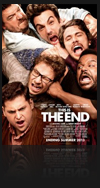 |
 | A Haunted House
It only took two weeks into 2013 for a film to reserve a surefire place on my end-of-the-year bottom ten, and one supposes it's apropos that said movie be a partial parody of 2012's first worst-list entry, "The Devil Inside." Awkwardly titled "A Haunted House"—why not "The Haunted House," or just "Haunted House," or how about the far more appropriate "Paranormal Indecency?"—this would-be comedy starring Marlon Wayans clangs like brass balls every time a joke or gag fails to ignite. Directed by Michael Tiddes, this ceaselessly debasing supernatural horror spoof comes too close for comfort to the sub-humanoid levels of a Friedberg/Seltzer catastrophe of the "Epic Movie"/"Disaster Movie" sort. There is no more wearisome and dismaying moviegoing experience than a comedy that is met by the deafening sound of audience members who collectively, yet silently, know what they're watching is junk. |
 |
 | The Family
A family brutally assassinated while having breakfast, "Martyrs"-style. A plumber who is assaulted within an inch of his life for being late to a house call. A teenage boy beat to a pulp with a tennis racket for making a move on a female classmate. A grocery store's inhabitants blown sky-high for uttering a few passive-aggressive xenophobic comments. A guy fantasizing about shoving a sizzling poker of charcoal in a neighbor's mouth. A man tied to the back of a truck and, in true hate-crime fashion, dragged until he's critically injured. These descriptions are not in reference to a torture-heavy horror flick, but that of rancidly mean-spirited mob comedy "The Family." Tone-deaf, painfully laugh-free, and leading up to a black hole of pointlessness, this is one of those disastrous studio pictures starring talented actors (Robert De Niro, Michelle Pfeiffer, Tommy Lee Jones) who should know better, directed by an established filmmaker (Luc Besson) who shouldn't have bothered. "The Family" is, quite frankly, a disgrace. |
 |
 | The Starving Games
Just when it seemed as if Jason Friedberg and Aaron Seltzer had insulted the Hollywood film industry enough and been banished for good from writing and directing their own movies, they show back up like a kind of cinematic Bubonic plague, infecting viewers with gangrene of the eyes, ears and brain. You want to numb your mind with zero entertainment value to offset the throwaway trashiness? These tone-deaf doofuses have got this particular lowly feat on lock. What they cannot do is devise a single amusing joke or pay it off with anything approaching proper cohesive timing. That their genre of choice is spoof comedy is embarrassing for them, and tragic for anyone with the misfortune of having to sit through their agonizing celebrations in moronic inanity. A parody of "The Hunger Games" without a solitary laugh to be mustered, "The Starving Games" is 83 minutes of rancorous stereotyping, lame bathroom gags and aimless, often bafflingly outdated film references. Yes, at one point someone whoops and hollers, "I'm the king of the world!" Yes, that line was already played out fifteen years ago. If the Zuckers and Abrahams and Brookses of the "Airplane!"/"The Naked Gun!"/"Young Frankenstein" era shot slapstick to commercial and critical acclaim, it is talent-deficient hacks like Friedberg and Seltzer who continue to do their part in giving these once-raucous comedies a bad name. "Dumb" humor does not actually have to be dumb—it can, in fact, be clever, smart and even insightful—and this is where they continually miss the mark by a gaping longshot. What is "The Starving Games," anyway, if not a blackened abyss into nothingness? |
 |

 | Escape from Tomorrow
"Escape from Tomorrow" might have the most fascinating behind-the-scenes story of any film released in 2013. Shot incognito over a period of several weeks on the grounds of Orlando's Disney World Resort and Anaheim's Disneyland, first-time writer-director Randy Moore took a huge gamble that cost roughly $650,000 with no guarantee in sight that the finished product would ever receive general public exhibition. Surely, a piercing horror-satire that turns the Mouse House on its head and then crushes it to obliteration would be held up for years—or forever—by legal matters. Instead, the film did see the light of day. Part slice-of-life drama, part mind-bending cautionary tale, part audacious portrait of a family in crisis, the crisply beautiful black-and-white "Escape from Tomorrow" absorbs the viewer instantly, first as a sort of offbeat, eavesdropping travelogue and then as a hallucinatory saga of broken dreams and adulthood desperation. From the ominous opening-credits montage of the Big Thunder Mountain Railroad and its mournful accompanying score by Abel Korzeniowski, a weight of crushing existential hopelessness invades the frame. As visitors to the Magic Kingdom run around, smilingly taking in the sights and attractions, Moore has a way of astonishingly peering past the park-imposed mirth and straight into the stark underbelly of a billion-dollar corporation that makes its money off of selling an artificial fašade of happiness to its customers—no matter the price. |
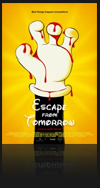 |
 | Prisoners
Tough as nails, achingly fallible, and wholly unsparing, "Prisoners" doesn't let go from its vise grip even after its chillingly provocative final shot. The story of two families' desperate search for their missing daughters and the detective dead-set on solving the case, Hugh Jackman and Jake Gyllenhaal lead an outstanding ensemble in a film that develops into far more than the revenge exploitationer it looked like in its advertising campaign. Evocatively lensed by cinematographer Roger A. Deakins, the encroaching bitterness and nasty late-autumn weather setting on lives already stranded in internal frigid despair, what director Denis Villeneuve and screenwriter Aaron Guzikowski have created is challenging and multilayered—a complicated morality play, a riveting thriller, and a tastily labyrinthine mystery all in one. The picture's last minute may anger those who prefer neat wrap-ups topped with a ribbon, but let them be mad. For everyone else who likes it when films leave the viewer with something to talk about while pondering its deeper implications, the closing moments are thrilling in their loaded ambiguity. Thematically dense and intelligently crafted, the darkly enthralling "Prisoners" will not easily be forgotten. It might run nearly two and a half hours, but it earns every one of those captivating minutes. |
 |
 | 12 Years a Slave
"12 Years a Slave" tells of an appalling stain in American history, and does so with such an unflinching absence of compromise that many viewers will likely have a hard time sitting through it. Watching it is necessary, though, and hugely rewarding. The film's story, based on the 1853 autobiography by Solomon Northup (played by Chiwetel Ejiofor), is one that needs to be told, and director Steve McQueen more than proves his worth as the one to tell it. His and screenwriter John Ridley's raw-to-the-bone depiction of one man's hellish dozen-year experience as a slave in the pre-Civil War era stands as telling counterpoint to Lee Daniels' recent "The Butler," a film that covered some of the same themes from a later time period, but did so with artificiality, casting gimmicks and an antiseptically sleek bow on top. "12 Years a Slave" has no bow and only a minor release from the cruel, unjustified experiences on display. That came much later—and much too late. A historical biopic free of the sentimentalism with which this genre is frequently guilty, the results weren't just supremely fine, but an example of important moviemaking transcending art as entertainment. |
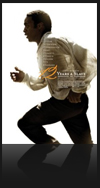 |
 | The Counselor
An El Paso-based attorney (Michael Fassbender) with a wandering eye toward achieving a quick financial windfall as he prepares to marry his sweet, traditional girlfriend, Laura (Penélope Cruz), involves himself in the wrong U.S.-Mexico drug trafficking scheme, and pays dearly for his actions. Calculated and haunting, slashing with the precision of a surgeon's scalpel and the ruthlessness of a sociopathic killer, "The Counselor" disturbs immensely while rising with indomitable stakes. Director Ridley Scott and screenwriter Cormac McCarthy prove to be a heavenly match made in hell, the former's perceptive attention to his mise en scène and the latter's talent for vividly unsparing tales with characters developed through their richly penned interactions meshing with ill-boding control. McCarthy is intentionally sketchy in what information he reveals, preferring metaphor and suggestion—and the intermittent burst of violence—to weave a tale as brutally "cautionary" as the 3.9-carat engagement ring the Counselor purchases for Laura. "The Counselor" is bleak, bleak, bleak for mainstream studio cinema, but does that really matter when a motion picture is as exquisitely helmed and stirringly envisioned as this one? |
 |
 | Blue Jasmine
When her powerful financier husband is sent to prison for fraud, pompous, pampered, Upper East Side trophy wife Jasmine's (Cate Blanchett) cushy life of parties, pilates and weekends in the Hamptons abruptly comes crashing down. Suddenly broke and with nowhere else to turn, she relocates to San Francisco to stay with her working-class sister, Ginger (Sally Hawkins), while planning her next move. Guided by a powerhouse turn from Cate Blanchett—really, it's less a performance than a force of nature—"Blue Jasmine" is a grievously funny, shrewdly devastating character study, as focused and emotionally rewarding as anything Woody Allen has made in the twenty-first century. Despite her politely snobbish, mildly insulting demeanor toward people of a lower social standing than the one she used to reside upon, there is something about Jasmine—a twinkle in her glassy eyes, mixed with a train-wreck quality in her erratic actions—that renders her impossible to turn away from or stop caring about. She is so sharply observed and so multifaceted despite most of said facets being unsavory that to have someone of Blanchett's caliber tackle the role with such relish is one of the year's most copacetic cinematic triumphs. |
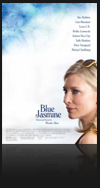 |
 | The Bling Ring
Sofia Coppola is undoubtedly my artistic soul mate. We have never met, and yet every decision she makes as a filmmaker—her naturalistic writing, her transcendent photography and ruminative editing, her indelible use of music, her intuitive work with her actors, her staggeringly unforced yet impactful comments about human behavior and longing—is in perfect lock and step with my own cinematic sensibilities. Her work is graceful, focused, and subtle yet visionary, but even more than all of that, her motion pictures speak to me in a way that is rare and miraculous. Based on the Vanity Fair article, "The Suspects Wore Louboutins," by Nancy Jo Sales, "The Bling Ring" doesn't tell what happened so much as what's happening. A here-and-now exploration into Generation-Z via a gaggle of fame-hungry Los Angeles teens who go on a robbery spree of the Hollywood elite, the film welcomes its audience to hop into the backseat for a joyride as dangerously thrilling as it is vividly disturbing. Whereas most filmmakers would be tempted to ridicule these teens, Coppola confronts her human subjects—and they are human, as worrisome as that might be on occasion—with minimal satire and a forthrightness that lends them a certain amount of empathetic concern. Alive and electrifying, provocative and beautifully crafted, "The Bling Ring" brings insight and hypnotic urgency to a story not to be believed if it weren't so unbelievably true. |
 |
 | Fruitvale Station
Winner of the top two Dramatic accolades at the 2013 Sundance Film Festival (the Grand Jury Prize and the Audience Award), "Fruitvale Station" isn't just an important motion picture, but a mournful cry over all the injustice the world has to offer. Though the film is based on the true story of a 22-year-old black man, Oscar Grant, whose life was taken from him long before his time, magnificent first-time writer and director Ryan Coogler has avoided all the pitfalls such a telling could have easily lapsed into had the project fallen into lesser hands. It is not a condemnation against white people or even a preachy sermon on racism. Its human subject is not an unblemished martyr, but a flawed, unevenly-tempered individual fighting temptation and adversity while trying to make good for his girlfriend and daughter. It is precisely because he's portrayed by Michael B. Jordan as a real person in progress rather than an angel that makes every moment of the film—and the foreknowledge of what happened to him—so achingly vivid and true. Stripped to its essentials yet understanding the necessity to observe the preciousness of life itself, "Fruitvale Station" is a devastating portrait of the fallibility of man and the importance of appreciating what one has while it's still here. The film serves as a hot-button think piece, but Coogler does not waste his time trying to make a point because he knows that the tough, stimulating strength of his material can speak for itself. It does just that, all right, and the events as played out prove to be as intensely riveting as they are unfathomably difficult to make sense of. |
 |
 | Gravity
A revolutionary cinematic leap beyond the stratosphere, "Gravity" is alarming, intoxicating, stomach-tossingly horrifying and emotionally shattering. It is also a prime example of exactly why the term, "awe-inspiring," was created, its fluid, seamless, photorealistic depiction of outer space as breathlessly authentic as, perhaps, any motion picture that has been made, to date. At 600 kilometers above Earth, there is no oxygen, no air pressure, and no sound—three facts that writer-director Alfonso Cuarón and his son, co-writer Jonás Cuarón, steadfastly abide by as they place two astronauts (Sandra Bullock and George Clooney) in a setting so vast and a situation so perilous that it will prove virtually unthinkable for most viewers. Using state-of-the-art digital effects the likes of which have scarcely been seen before, the elder Cuarón puts his audience through an exhilarating tailspin while actualizing onscreen technical feats that are just about as close to being in space as one could imagine while still having his or her feet planted firmly on the ground. More than that, though, it is a study in coming to grips with the eventuality of death and one's fight for survival in a world as mysterious as it is transcendentally beautiful. "Gravity" boldly takes the science fiction genre into a realm where it nearly ceases being fiction at all. |
 |
 | Spring Breakers
From the moment it was announced, "Spring Breakers" was fated to be misunderstood. Some have called it a flashy, R-rated gimmick solely because it features former Disney stars Selena Gomez and Vanessa Hudgens in roles of a decidedly more risqué nature. Others have viewed it as an empty exercise in hedonism. Upon theatrical release, many flocked to see it just for the kick of watching scantily-clad beauties parade around while drinking to excess, having sex, and packing heat in a temperate climate. All of the above grossly missed the point. As written and directed by fiercely independent virtuoso Harmony Korine, the picture captures and, in some cases, satirizes the trashy-cum-decadent allure of a modern spring break excursion while pointedly critiquing the rampant desensitization over our current pop-, gangsta-, criminal-as-celebrity-culture. If the Floridian beach town of St. Petersburg is shot by cinematographer Benoît Debie as a kaleidoscope of sunshine and sunsets vaguely shielding the grimmest of underbellies, it is James Franco's fearless, note-perfect performance as a shady drug-dealing townie who accentuates said threat. In the wrong hands, his Alien—all cornrows, tattoos and mouth grills—could have come off as a ridiculous caricature not to be bought for a second. Franco anchors this sleazy, off-beat character in something darker and more honest, sending his role straight into the iconic cinematic lexicon. A journey toward illusory freedom that ends up a glowing neon nightmare, "Spring Breakers" takes the presumed self-enlightenment of four nubile college friends and drives them straight to a hell they soon will not be able to escape from. It's amusing, maybe a little forlorn underneath that, and ultimately chilling beyond belief. |
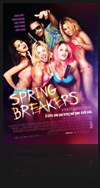 |
 | Trance
Irreverent and disturbing, blisteringly innovative and shockingly sweet, "Trance" bulldozes its way through all conventional expectations as a crime drama about a painting heist to present a new brand of cinema existing somewhere between neo-noir and neo-ecstasy. An uncommonly strange and resplendent ode to David Lynch, British crime sagas, the French New Wave, and spirit-soaring love stories, this could be director Danny Boyle's most rapturously oddball yet satisfying piece of work yet. At once ethereal and daunting, a tantalizing puzzler seamlessly weaving layers of subconscious memory and literal hypnotic fantasy with that of bitter truths folding in on themselves, the film traverses so many genres and emotional territory in the span of only 101 minutes that it's difficult to bring justice to just how enormously special and rare and one-of-a-kind it is. Experiencing it only once is guaranteed to not be nearly enough. Anchored by mesmerizing performances from a never-better Rosario Dawson as the psychologist stuck between James McAvoy's amnesiac art auctioneer and Vincent Cassel's career thief, "Trance" plays fair in its psychology while suggesting that the human condition is never one neatly packaged commodity, but a variety of good and bad decisions, positive and negative traits, necessary and insightful experiences that make each person and their journey who they are. "Breathtaking" is an adjective that should be used sparingly when discussing film, lest the word begin to lose its rightful weight and inference. "Trance" is just that, and then so much more. |
 |
|
© 2013 by Dustin Putman
 |
|
|
|